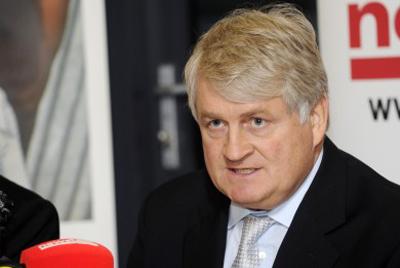Why I think O'Brien is not a fit person to control INM

Given his interference in editorial matters in INM, in contradiction of the principles he himself has enunciated, Denis O’Brien is not a fit person to be allowed control the country’s second most powerful media enterprise. By Vincent Browne. (Updated: Denis O’Brien’s two letters and my response to the first can be read below.)
Denis O’Brien wrote two letters to me, one on 21 June last, the other on 20 July, the latter in response to an email from me on 8 July. The first of these letters contained a threat to sue me personally, if, in his view, I defamed him in further references to the findings of the Moriarty tribunal report. The second raised a few interesting issues to do with the control of the media.
In response to a point I had made about the necessity for a plurality of media ownership and control, he wrote in the second letter: “Perhaps you might like to consider that since the media finds it increasingly difficult to make a profit, it requires owners who can make money elsewhere to effectively subsidise important journalistic activities. Once they do so at an appropriate distance from editorial matters there shouldn’t be a problem.”
He continued: “I am keenly aware of the influence that has been brought to bear in certain elements of the Irish media, having borne the brunt of agenda setting over the past 10 years. That experience has reinforced my understanding of the responsibility that rests with media owners not to interfere with editorial content.”
Denis O’Brien is certainly right in his suspicions about how his predecessor as controller of Independent News Media, Tony O’Reilly, used his position to interfere directly with editorial policy. Prior to the 2007 general election, the Sunday Independent pursued a relentless campaign against the then taoiseach, Bertie Ahern, then immediately following a private meeting between Tony O’Reilly and Bertie Ahern, the line changed direction 180 degrees. The claims by the Sunday Independent now that such interference never occurred are plainly false.
But would Denis O’Brien be any different and how credible is his position that controllers of the media should act “at an appropriate distance from editorial matters” and his understanding “of the responsibility that rests with media owners not to interfere with editorial content”?
Courtesy of leaked Independent News Media memos (available on the broadsheet.ie website), we know of how Denis O’Brien tried to interfere directly with editorial policy. Gavin O’Reilly, the recently deposed chief executive of INM, recorded, in a series of memos and communications, conversations he had with one of Denis O’Brien’s then representatives on the board of INM, Leslie Buckley.
On 29 October 2010, Leslie Buckley contacted Gavin O’Reilly following a conversation Leslie Buckley had had with Denis O’Brien who, according to Leslie Buckley, was “very upset with [journalist] Sam Smyth”.
Denis O’Brien alleged Sam Smyth was conducting “almost a vendetta” against him. He wanted to know whether Sam Smyth could be taken off the story of the Moriarty tribunal and moved on to something else. Leslie Buckley said Sam Smyth’s piece in that morning’s Irish Independent was okay but his performance on the previous Tuesday night’s Prime Time programme was “aggressive” and “hostile”.
At the time, Denis O’Brien was threatening to sue Sam Smyth personally for remarks made on another television programme. Leslie Buckley said Sam Smyth had done his job (on the tribunal) and should now be moved on to another story.
On 5 November 2010, Gavin O’Reilly had a transcript done of a phone message left by Leslie Buckley: “Hi Gavin, Leslie here. Got your text message. Really what we are talking about is there somebody who can be down there, I know there are other reporters, really kind of writing pretty positive situations. There was one good story last week carried – I can’t remember who, but by and large, it’s generally negative stuff. Someone with our friend down there I think really trying to ensure that a good balanced story comes out. That would be much appreciated. Give me a bell as I’d like to try to resolve this.”
How does such conduct measure up to what Denis O’Brien says is the proper role of the owner/controller of a media enterprise to act “at an appropriate distance from editorial matters” and “the responsibility that rests with media owners not to interfere with editorial content”?
And how plausible is it that the removal of Sam Smyth from a Sunday morning radio programme on Today FM, which Denis O’Brien controls, and his ostracisation now within the Irish Independent to which he is contracted (not one article by him has been published for some months), isn’t part of the same campaign which Denis O’Brien and Leslie Buckley, conducted against Sam Smyth in 2010?
Although in my reply to Denis O’Brien’s first letter to me, I made specific reference to the treatment of Sam Smyth and cited this as a reason why Denis O’Brien should not be allowed control INM, he made no response to this in his replying letter.
Denis O’Brien has said he does not control INM. However, given his interference in editorial matters in INM, in contradiction of the principles he himself has enunciated, even aside from the findings of the Moriarty tribunal against him, I do not believe Denis O’Brien is a fit person to be allowed control the country’s second most powerful media enterprise.
{jathumbnailoff}
//
Denis O'Brien & Vincent Browne correspondence (PDF)
Denis O'Brien & Vincent Browne correspondence (Text)
